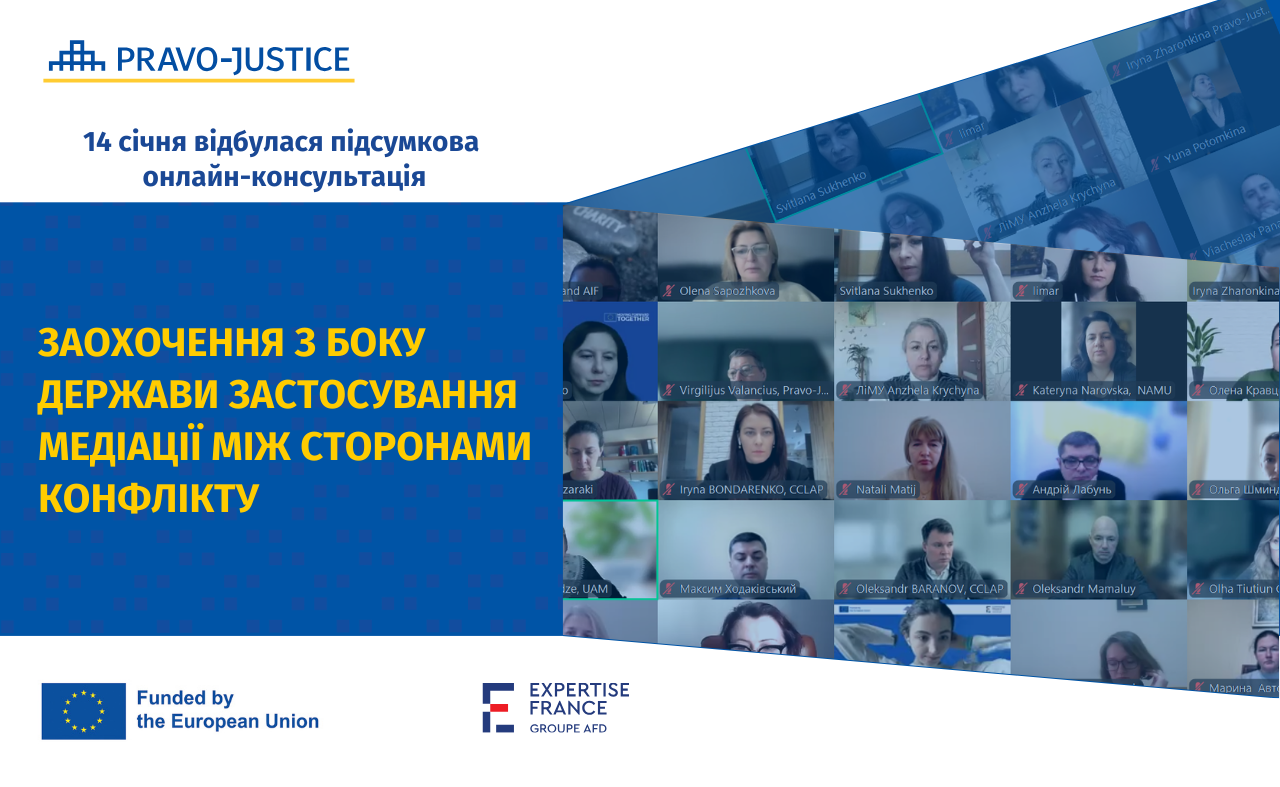A Discussion on the Prospects for Broadening the Use of Mediation in Ukraine Took Place in the Framework of Legal Monitoring

On 14 January, the Ministry of Justice of Ukraine, with the support of EU Project Pravo-Justice, held a final online consultation "How a State Can Encourage Parties to a Conflict to Use Mediation" in the framework of legal monitoring. Representatives of the Ministry of Justice, the Ministry of Social Policy, the State Property Fund, the Free Legal Aid Centre, mediators, and experts from EU Project Pravo-Justice participated in the discussion.
"The Directorate conducted two surveys among free legal aid system providers, lawyers, and mediators on key approaches to developing mediation in Ukraine. Some respondents called for introducing mandatory mediation information and assessment meetings in some categories of cases and introducing the mechanisms necessary to monitor the quality of services," said Svitlana Sukhenko, Head of the Expert Group on Justice Sector Institutions of the Directorate of Justice and Criminal Justice of the Ministry of Justice.
She also clarified that the mediators emphasise the importance of building and promoting mediation infrastructure. Meanwhile, the FLA system representatives and lawyers believe it would be worthwhile to implement a pilot project to test this procedure.
Svitlana Suhenko also said that survey findings indicated two possible models for developing mediation. The first is administrative. It envisages mandatory MIAMS for certain categories of cases, for example, those involving the interests of children. The second model is voluntary. It provides for the widespread promotion of mediation among people, along with the obligation of judges and lawyers to explain the benefits of out-of-court dispute resolution to participants in certain categories of cases.
"Both models have their advantages and limitations. The Directorate's goal is to use your suggestions and observations to integrate the model that will contribute to the harmonious development of mediation in Ukraine, improve access to justice and introduce European best practices in conflict resolution into the country's legal framework," said Svitlana Suhenko.
Virgilijus Valančius, Senior International Expert of Support to EU Integration Process in the Justice Sector Component at EU Project Pravo-Justice, elaborated on the international experience of using mediation. In particular, he emphasised that it is advisable to use mediation in administrative disputes.
"The EU adheres to the approach that mediation should be used not only in civil and commercial but also in administrative disputes. Applying mediation in administrative disputes can become an effective mechanism for improving the standing of public authorities and facilitating faster case consideration," said Virgilijus Valančius. However, he stressed that not all administrative disputes are mediable. In his opinion, in Ukraine, which for almost three years has been living in the midst of Russia's full-scale military aggression, it would be advisable to consider applying mediation in disputes involving military personnel and members of their families regarding appeals against the actions of the conscription authorities, decisions of military medical commissions, medical and social commissions, etc.
"All these cases are emotionally charged. To avoid the escalation of the emotional and psychological load of the parties to the dispute, mediation can be used as an effective tool in resolving conflicts and reaching an understanding between the state and this category of plaintiffs," the expert added.
Viacheslav Panasiuk, national expert of EU Project Pravo-Justice, presented the peculiarities of introducing administrative and voluntary models of developing mediation in enforcement proceedings.
"After examining international experience and analysing national legislation, a team composed of Project experts, representatives of the Association of Private Enforcement Officers, the Ukrainian Academy of Mediation and international experts are developing a draft law on applying mediation at the stage of enforcement of a court decision, i.e. after opening enforcement proceedings," said Viacheslav Panasiuk. According to him, it is currently proposed to allow initiating mediation in enforcement proceedings before the debtor's property is found.
"If both parties to the proceedings agree to mediation, the enforcement officer will have the right to suspend enforcement actions for up to 10 days. If the creditor and the debtor conclude a settlement agreement within this period, the enforcement officer may return the enforcement document," Viacheslav Panasiuk said. The expert stressed that a private enforcement officer who has completed proper training and received a mediator's license may act as a mediator at the stage of enforcement of a court decision. There is a plan to enshrine the maximum remuneration for a mediator in enforcement proceedings in legislation.
In her speech, Luiza Romanadze, Team Leader of EU Project CONSENT and President of the Ukrainian Academy of Mediation, stressed that it is crucial to implement a mixed model of developing mediation. She outlined the key features of an integrated approach to building an infrastructure to ensure that mediation is widely used in Ukraine as an efficient method for alternative dispute resolution.
"The state should make all efforts to inform the public about mediation and its benefits. We should encourage people to voluntarily include mediation clauses in contracts. The procedural legislation should also enshrine that court proceedings in such cases will begin only after the parties confirm that they have tried to resolve the dispute through mediation," suggested Luiza Romanadze. She also proposed to vest judges with the authority to recommend the parties to a conflict to resort to mediation.
Oleksandr Baranov, Director of the Coordination Centre for Free Legal Aid, spoke about the role of the free legal aid system in developing mediation. According to him, the FLA has been providing mediation services since 2013. He also emphasised that it is necessary to elaborate regulations on selecting a mediator and paying for mediation services.
"Currently, if the state has provided a client with a free defence lawyer and the lawyer provides quality services, there are no grounds for replacing him or her. If clients want to have another defence lawyer, they must pay for their services themselves. The same approach should be used to provide government-funded mediation services to people through the FLA," suggested Oleksandr Baranov.